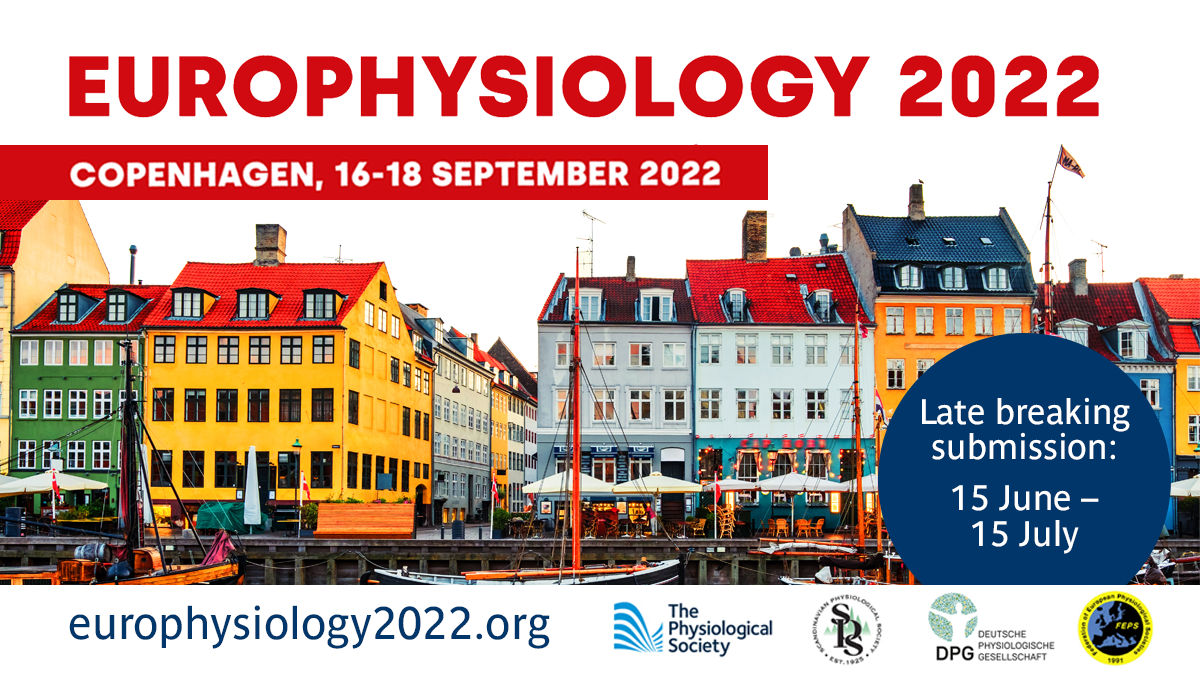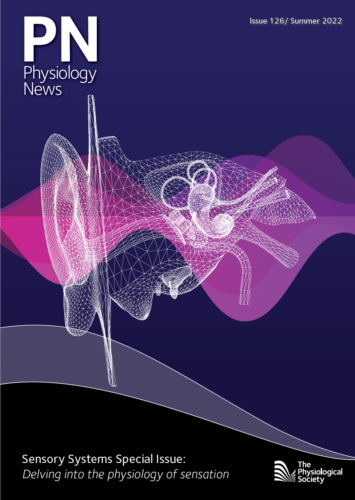
Physiology News Magazine
Meeting Preview: Europhysiology 2022 pre-conference symposia
15 September 2022 Europhysiology in Copenhagen, Denmark
Events
Meeting Preview: Europhysiology 2022 pre-conference symposia
15 September 2022 Europhysiology in Copenhagen, Denmark
Events
https://doi.org/10.36866/pn.126.34
Our Annual Conference in 2022 will be taking place as part of Europhysiology in Copenhagen, Denmark from 16 – 18 September 2022. The main conference is preceded on Thursday 15 September by a day of eight symposia, bringing together communities for focused scientific discussions and networking followed by a canal tour in the evening. Pre-conference symposia are free to attend but you must be registered for Europhysiology 2022. The most up-to-date programmes can be found at: https://europhysiology2022.org/presymposia-on-15-september-2022/.

A snapshot of the pre-conference symposia
Young Physiologists Symposium
The Young Physiologists Symposium is organised by Early Career Researchers and will run from 08:00 to 11:30 CEST. We want to support the early career journey with an event where you can learn about opportunities to further your academic or non-academic careers. The event starts with talks on ways to increase your academic impact and expertise. These will be given by a successful Editorial Board Fellowship candidate and a Programme Officer for a Research Foundation, both of whom will share skills and paths to widen your academic opportunities. After a networking break, you will hear about innovative new projects and programmes beyond academia, including the experience of people working in the pharmaceutical industry or those translating their research into start-ups. Following this morning symposium, you’ll have your pick of afternoon symposia, where you can interact with speakers and attendees in your research field and beyond!
The organising committee:
Dr Felix Beinlich, University of Copenhagen, Denmark
Dr Gustavo Chaves, Klinikum Nürnberg Medical School, Germany
Dr Ana Cruz, University of Exeter, UK
Dr Rehan Junejo, Manchester Metropolitan University, UK
Dr Dominik Lenz, Philipps University of Marburg, Germany
Dr Andreas Ritzau-Jost, University of Leipzig, Germany
Special Interest Group meetings run from 12:00-17:00 CEST
Vascular Physiology
Our central aim is to showcase the work of early career researchers selected from a range of prominent groups across Europe. The focus will be on topical areas of vascular physiology, including: research on transcriptional control in vascular cells, hormonal regulation of vascular tone, in vivo imaging and global health problems. By interspersing presentations by early career and senior physiologists we have created an exciting and interactive programme that will stimulate discussion. The Vascular Physiology symposium has been jointly organised by the special interest groups of The Physiological Society, the Scandinavian Physiological Society and the German Physiological Society.
The organising committee:
Professor Christopher Garland, University of Oxford, UK
Professor Thomas Korff, University of Heidelberg, Germany
Professor Michaela Kuhn, University of Würzburg, Germany
Dr Vladimir Matchkov, Aarhus University, Denmark
Comparative Physiology
This will be the inaugural symposium for the newly formed Special Interest Group for Comparative Physiology from the Scandinavian Physiological Society. We have assembled interesting speakers on a variety of timely topics in comparative physiology, from mechanisms of stress tolerance in tardigrades, to Arctic chronobiology and anoxia-tolerant fish. We will also use this opportunity to host a discussion on future activities in our group. Comparative physiology offers unique insight to an intelligent choice of animal models for biomedical research, but also has a fundamental value in its own right. We hope this symposium will highlight the many wonderful and exquisite adaptations to various environments and provide both academic insight and a firm understanding of animal physiology to show how and why the current destruction of natural environments will lead to extinction of species worldwide.
The organising committee:
Dr Sjannie Lefevre, University of Oslo, Norway
Professor Tobias Wang, Aarhus University, Denmark
Cardiac Physiology
Building on the success of the pre-conference symposium at Europhysiology 2018 we have arranged this symposium on cardiac physiology. The scientific programme for this pre-meeting includes four exciting sessions on human, human-induced pluripotent stem cell-derived cardiomyocytes, the microtubule network in health and disease, protein turnover and quality control and novel potential therapies for heart disease – meet the industry. We have organised an international programme that includes speakers from Scandinavia, Germany, UK and US and invited both established researchers and early career scientists for exciting scientific talks and networking. In London, more than 100 physiologists met at the Cardiac Physiology pre-conference symposium. We are sure to surpass this number in Copenhagen!
The organising committee:
Dr Andrew James, University of Bristol, UK
Professor William E Louch, University of Oslo, Norway
Professor Wolfgang A Linke, University of Muenster, Germany
Dr Morten B Thomsen, University of Copenhagen, Denmark
Renal Physiology
The Renal Physiology pre-conference symposium is broadly focusing on key topics in renal transport physiology and mechanisms underlying renal disease. We have secured many notable speakers who will deliver specific insight into new methodologies and novel physiological findings in their respective areas. The focus will be on three main topics: a session on claudins and paracellular transport in kidney, a session on renal ion transport proteins involved in transcellular transport and finally a session on the molecular mechanisms underlying renal disease. There will be ample room for scientific discussion, and we welcome all interested at any career level to participate.
The organising committee:
Dr Henrik Dimke, University of Southern Denmark, Denmark
Professor Markus Bleich, Christian-Albrecht University-Kiel, Germany
Skeletal Muscle
The Scandinavian Physiological Society’s Special Interest Group in Skeletal Muscle is looking forward to hosting a pre-conference symposium entitled Novel Approaches and Insights on Skeletal Muscle Structure and Function in Health And Disease. The symposium comprises six invited talks covering exciting skeletal muscle subjects such as stem cells to performance, analyses of cellular responses to exercise using single-cell sequencing, studies of the role of circulating factors in exercise-induced tissue remodelling, as well as mitochondrial function and dysfunction. Also, four short talks will be chosen from abstracts – so we encourage students, postdocs, and colleagues to submit your work for presentation. In addition to sharing and discussing our most recent understanding of skeletal muscle function and adaptation in health and disease, we aim to boost scientific interactions between researchers in the skeletal muscle community in Scandinavia and Europe.
The organising committee:
Professor Theresia Kraft, Hannover Medical School, Germany
Dr Johanna Lanner, Karolinska Institutet, Sweden
Dr Julien Ochala, University of Copenhagen, Denmark
Dr Kristian Vissing, Aarhus University, Denmark
Human, Exercise and Environmental Physiology
This Human, Exercise and Environmental Physiology pre-conference symposium is organised by the The Physiological Society’s Theme Leads for Human, Exercise and Environmental Physiology and is entitled Is There a Norm in Human Physiology? Biological Influences in Health and Disease. Speakers from all career stages will talk about their research into different aspects of physiological diversity. We will hear about how sex and hormones affect responses to exercise, how age impacts key aspects of human movement, as well as how race and skin pigmentation influence physiological function. We will also discuss the need to widen the demographic in physiological research, and why this is important to study the human body comprehensively to optimise outcomes for all humans.
The organising committee:
Dr Paul Ansdell, Northumbria University, UK
Dr Irene Di Giulio, King’s College London, UK
Neuroscience
The Neuroscience pre-conference symposium will bring together world leaders in the study of histamine and the nervous system, and the wider community for face-to-face networking to create international connections. This symposium aims to showcase the latest research, methodologies, and developments in the field. The topics will range from studies in the healthy nervous system at the level of synapses, neuronal circuits to whole animals. We will also outline the latest technological developments and methodologies to accurately measure histamine in the nervous system and recent studies of histamine dysregulation in disorders of both central nervous as well as the peripheral nervous system disorders.
The organising committee:
Dr Tommas Ellender, University of Oxford, UK
